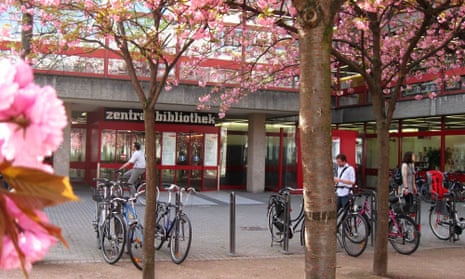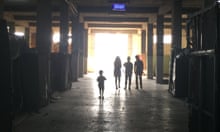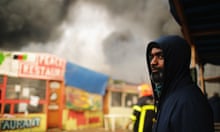While a flurry of snow threatens to fall outside at any moment, Sanaw, a 30-year-old Kurdish Christian from western Iran, is proudly describing his involvement in a nativity play over Christmas.
He holds court at a table of eight fellow refugees, explaining in coherent German how the local theatre group, of which he has only been a member for a matter of months, has helped to improve his sense of belonging in Cologne, his home city for just over a year.
“Even though I’m living in a refugee camp, I was able to interact with a few locals,” he says, as the group listen intently. “And I was also able to learn German without doing a course.”
Sanaw, a graphic designer who ran his own agency back home, is one of the growing number of users of Cologne Public Library’s sprachraum (language space).
The sprachraum, a large ground-floor room that sits opposite the main library building, serves as both a meeting point and learning hub for the city’s migrant community – which, as of December 2016, is 13,253-strong.
From a UK vantage point, Cologne Public Library – which recorded more than two million visitors in 2015 – stands in direct contrast to prevailing trends. According to a BBC investigation last year, 350 libraries have closed across the UK since 2010, contributing to 8,000 job losses. Addressing the House of Lords in October, Big Issue founder John Bird urged for urgent action to be taken to ringfence library funding.
“If you are going to cut libraries you must be prepared to build more prisons, to build more homeless hostels,” said Bird. “Libraries are essential, yet what is happening is that they are being cut.”
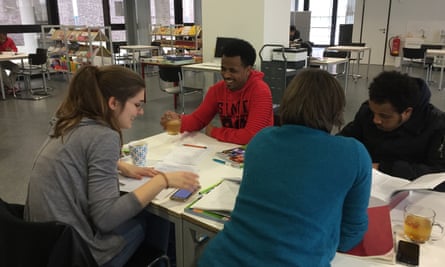
His argument was supported by Baroness Gail Rebuck, Labour peer and chair of the Penguin Random House publishing group, who said: “Libraries should be seen as key community centres, open to all, where, alongside books, people can rely on other essential life services.”
In Germany, however, libraries appear to have retained their cultural status. According to broadcaster Deutsche Welle, footfall in German public bibliothecae actually grew by 5 million people between 2013 and 2015.
That’s not to say they have been without their own budget fears. But unlike many of their UK counterparts, German libraries have better adapted into dynamic spaces with a bent towards digital and community engagement as well as printed matter.
Many public libraries in Germany, including Cologne, now include “maker spaces”, in which users can experiment with new technologies, including 3D printers and virtual reality glasses. For every study room, there is likely to be a cafe or children’s play area.
On this cold Saturday afternoon, the group is here for “Offene Deutschhilfe” (literally “Open German Help”), a weekly workshop aimed at helping refugees in a range of matters, from German vocabulary to filling in job applications and finding accommodation.
As Susanne – one of the two volunteers hosting the session – recommends to Sanaw an free recital held by the Chamber Philharmonia Cologne, one-to-one language lessons are taking place on tables dotted around the space. Others are at workstations reading emails; a man in an oversized bomber jacket pours himself a coffee.

The sprachraum was conceived by Dr Hanne Vogt, the Cologne Public Library’s director, in 2015 – the same year in which Germany welcomed more than 1 million asylum seekers as part of Angela Merkel’s open-door border policy.
“The idea actually came about before the first huge wave of refugees came to Germany,” explains Vogt. “I was seeing a lot of people who were coming to the central library for language lessons, who were asking if there was any additional space where they could go for extra classes. At that time, we didn’t have anything.”
It was around this point that Vogt discovered an abandoned room across the square abutting onto the library’s main entrance. The librarian pitched the idea of a space exclusively for refugees to City Hall, which was paying rent on the property.
“They agreed instantly,” says Vogt. “It then took us three or four months to finalise the room and get all the furniture. It’s now been open for around 18 months, and it’s in good condition. If you have a nice space, people will always take good care of it.”
Today, the sprachraum counts the Red Cross as one of its key partners, as well as several “private initiatives”, says Vogt. It has also seen its number of volunteers – on whose custodianship the space is entirely dependent – increase from 20 to over 50 in the last year.
The volunteers come from a broad cross-section of Colognian society, explains Sarah Dudek, sprachraum coordinator. “They consist of everyone from students, university lecturers and retired teachers, to advertising professionals,” she says. “We’ve also started to have volunteers who are migrants themselves, and who have similar stories to the new refugees.”
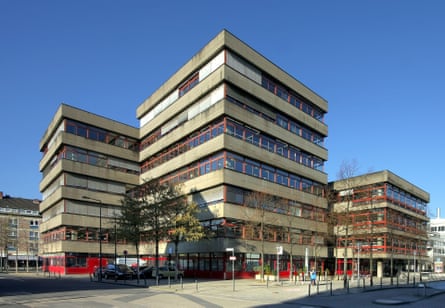
“We are giving more training to them, too,” adds Vogt. “Only last week, we had a meeting to discuss what they need and what could be done better, such as having more of a presence on social media.”
But even with a more than twofold increase in volunteers, “we need more back-up”, says Dudek. Sundays aside – when public libraries, like retail stores and supermarkets, are required to shut by German law – sprachraum has a busy calendar, holding daily events.
These include games afternoons, arts and crafts sessions, and well as mentoring sessions for families and children. Recently, the library – one of Germany’s biggest – also kickstarted a joint digital storytelling project with counterparts in Malmöo, Roskilde and Athens, through which refugees are encouraged to share their personal experiences.
While its social media presence may need tightening up, new people are finding their way to the sprachraum all the time through a mix of lessons put on in the library and subsequent word of mouth.
For Vogt – who has held the directorship in Cologne since 2008 – the sprachraum embodies the shift in the role of the 21st- century library; a byword for community engagement. “It’s a space that belongs to the public,” she says.
Could UK libraries learn from its example? Absolutely, she argues, citing other German institutions running their own refugee programmes. They include the Association of Public Libraries in Berlin, which is the first German library association to provide library cards to refugees without demanding an official certificate of registration – normally a strict prerequisite in Germany.

“There are other cities doing this, although I’m not sure they have such a nice extra space as the sprachraum,” she says wryly. “Many of them are offering guided tours and materials, offering space. They are engaged in this.”
She believes Germany’s libraries, particularly in the bigger cities, have an obligation to meet the needs of asylum and refugees. Libraries in the UK, which has taken far fewer refugees– perhaps feel less of an onus to do the same, suggests Vogt.
Back at the “Offene Deutschhilfe” session, introductions are being made. Following Sanaw’s lead, Nizar, also from Syria, is discussing his hopes of returning to his true vocation as a tailor. He currently works as a caretaker in a local hospital. Vogt, who drops in on the session, reveals there is a sewing station on the fourth floor of the library, and suggests he bring some materials the next time he is over. “Maybe you could sew something for the [Cologne] carnival this month,” says a member of the group, and is met by a chorus of encouragement. Nizar smiles.
All eight refugees share the same objective: to be able to integrate into their new culture, even if it is not always easy. A spate of sexual assaults on women in Cologne on New Year’s Eve 2015 was linked to migrants, providing fodder for far-right populist groups such as Alternative for Germany and Pegida.
Some are finding the challenge harder than others.
Ibrahim, a 32-year old Libyan and IT professional, describes his fruitless hunt for a flat. “I don’t stand a chance,” he says. Mohammed, a 30-year-old hospital worker, speaks of his hopes of doing a master’s degree but fears he will be precluded of the chance due to limited placements.
Michael, an Eritrean who has lived in a hostel for the past five months following a “catastrophic journey” from his homeland via Libya and Italy, simply wants to meet more of his fellow townsfolk.
“I don’t know any,” he says, “apart from the ones I meet here at the library.” At this, the whole group nods in agreement. “And you fill this room with life,” replies Dr Vogt with a warm smile.
Some of the names have been changed.
Follow Guardian Cities on Twitter and Facebook to join the discussion, and explore our archive here
